WriterZen - Keyword Research Workflow: How to Simplify Yours & Craft Quality Content At a Go

“When should we expect the keywords for our content strategy?”
The client asked, and Angela took a deep breath. If only they knew how stressful it was for her to research keywords.
“Please give us another two weeks to conclude everything.”
As the Zoom call ended, Angela wished she could find an easier way to finalize the keyword research. It was her most dreaded part of creating an SEO content strategy. And moving from one tool to another in search of keywords to export and sort manually wasn’t helping.
Does this resonate with you?
Perhaps, you’re researching keywords right now. Or here because you’re about to start a new project. Or you’re a content manager trying to learn the ropes.
Whichever stage of the journey you’re in, we can all agree that:
Keyword research is stressful!
And juggling different tools and spreadsheets like Angela makes it even more difficult. Darcy Ogdon-Nolan, Founder of The Bircher Bar, said it best:
“It’s the basis of building a good niche site. However, it can be one of the more difficult and time-consuming tasks, especially when you have to jump between several different tools to uncover, categorize, and plan your KW targets.”
But let’s face it.
What Angela and content managers like you fail to understand is that researching keywords isn’t the problem. How you’re doing it is.
In other words, your keyword research workflow is the problem.
It’s why Jimmy Rodela, Founder of Outranking Digital, recommends using a reliable keyword research tool. And that’s one that simplifies your keyword research workflow, fetching you low-competition queries in hours not days.
Angela didn’t have such a tool at her disposal.
But you're no Angela.
You have a chance to turn things around for yourself, clients, and your team.
You can simplify how you research keywords, cluster them around topics in your content strategy, and even create high-ranking content in one place.
I’ll show you how to do all that through this guide. Also, you’ll see how WriterZen, a simplified content workflow software, turns your keyword research process from a back-breaking one to something easy and fun.
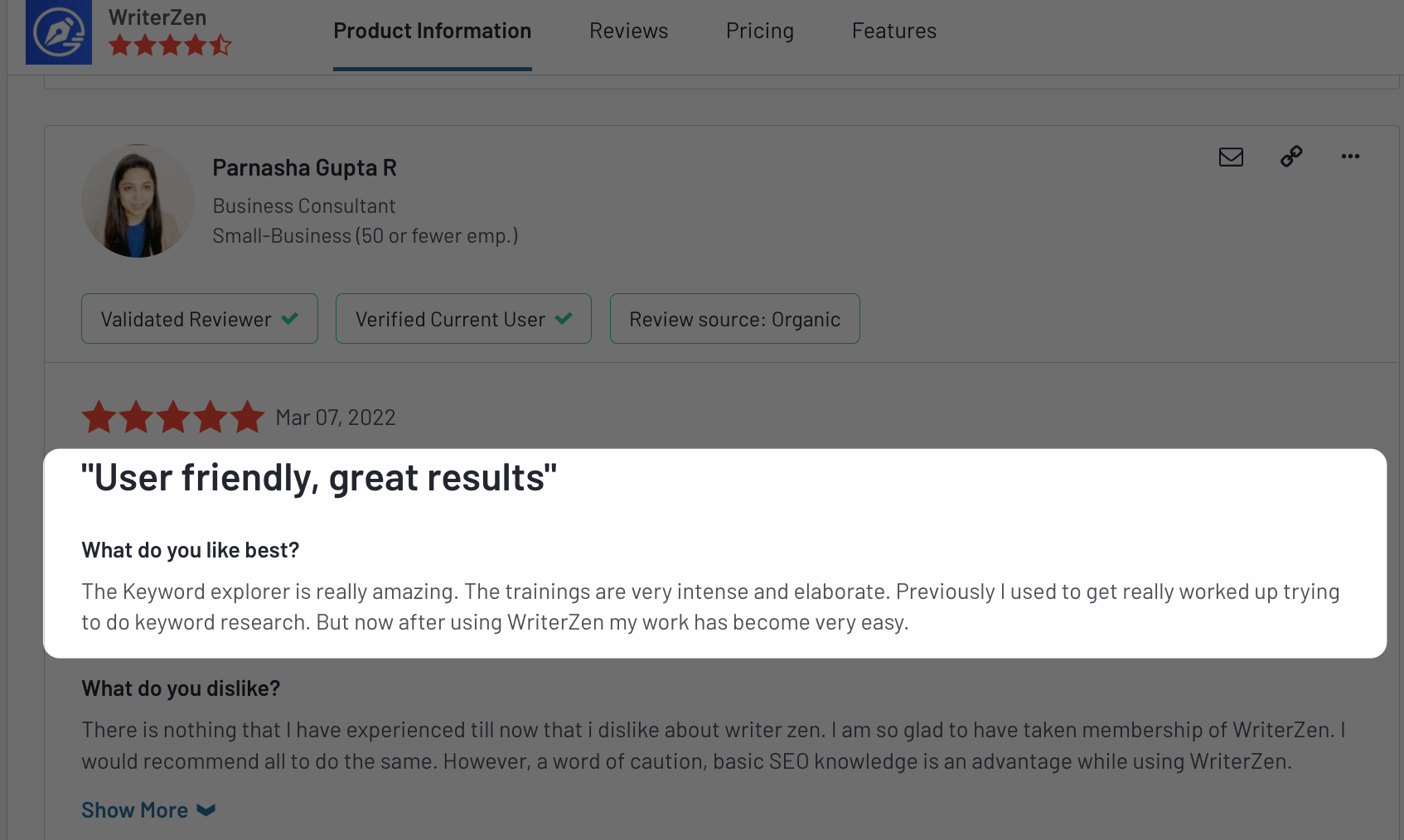
[WriterZen review on G2]
The Problem with How Most Content Managers Research Keywords
Perhaps, if you had your way, you’d skip the extensive research and take a wild guess to find keywords for your content strategy.
Unfortunately, it’s a necessary evil you can’t escape. As Keith Goode, Principal SEO Product Manager for Cox Automotive, put it:
“Keyword research is foundational to the whole marketing strategy.”
92% of search marketers perform keyword research in advance of new content. According to the State of Search Marketing Report, they do so to:
“...gain insight into how their audience searches for their products and services. This improves your likelihood of ranking for these terms and ultimately driving more traffic to your website.”
But if you’re like the 39% of marketers who, in 2014, saw keyword research as the most difficult part of SEO, you may be guilty of these mistakes:
Targetings Keywords that don’t Suit Your SEO Campaign
One mistake search marketers make: focusing on any high-volume long-tail keyword without considering their ability to rank for it.
That is, you select keywords high in search volume, not minding its competition or place in your SEO campaign.
Daniel Lofaso, Founder of Digital Elevator, observed this error among marketers. And to remedy the situation, he suggested:
“Instead of targeting keywords or topics that have high volume, we need to target keywords and topics that we actually have a chance to rank for, making the best use of our time and SEO efforts.”
An excellent way to take Lofaso’s advice is to use Zen Matrix.
It’s a method of finding and categorizing ideal long-tail keywords that rank fast based on their search volume and allintitle index:
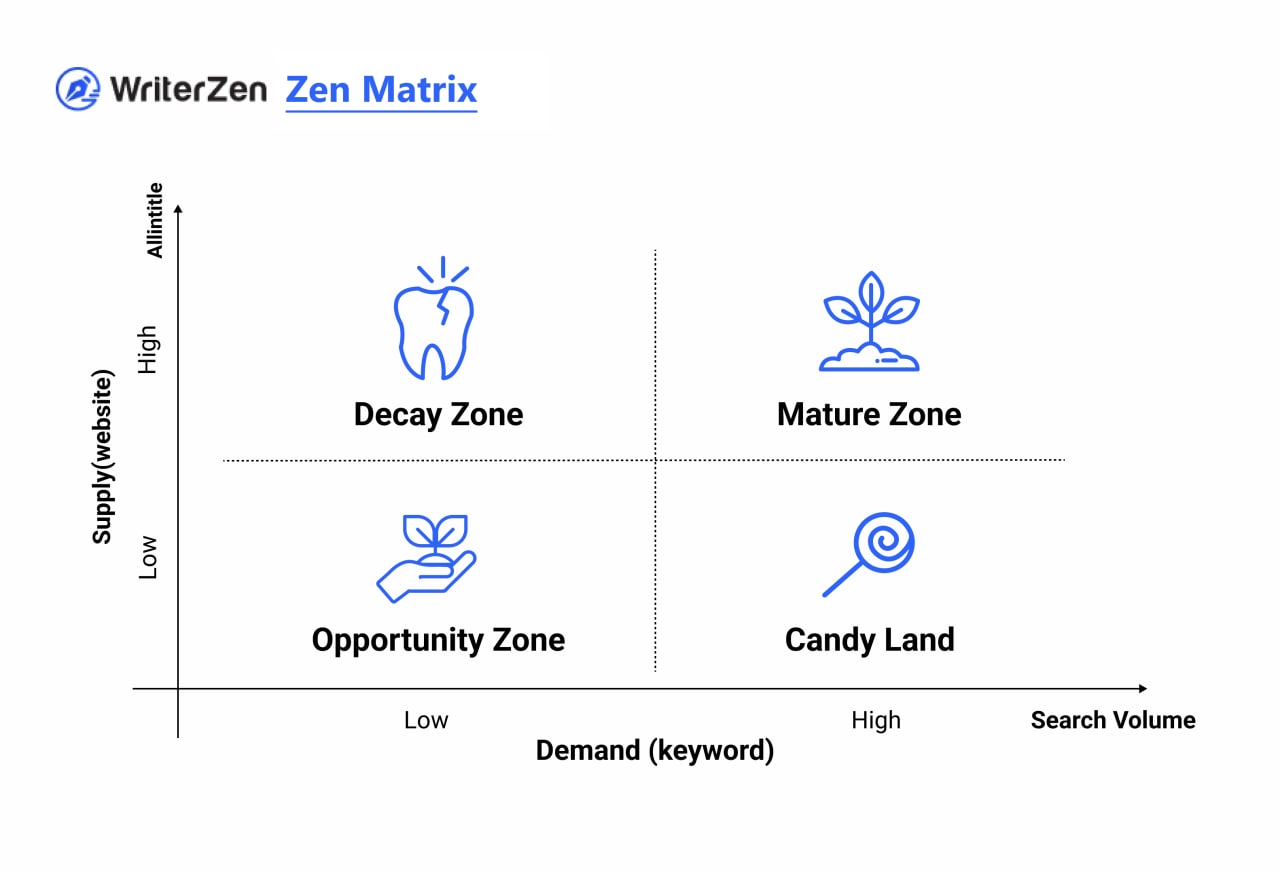
This is how it works;
- Decay Zone contains keywords that once had high search volumes but no longer generate traffic.
- Mature zone comprises keywords with high search volumes and high competition. They’re difficult to rank for.
- Opportunity zone contains rankable keywords with low competition and low search volume as only a few websites know about them.
- Candy land comprises fast-ranking keywords with high search volume and low allintitle.
Instead of targeting just any long-tail keyword, use the Zen Matrix framework and focus on the opportunity and candy land zones.
By doing so, you’ll easily find and categorize keywords that reward your SEO efforts without extensive research.
Juggling Too Many Tools
One minute, you’re searching for the right long-tail keywords and analyzing their search insights. Next, you’re exporting and sorting them manually for further analysis.
And this means switching or opening different tabs as you move from one tool to another and then your spreadsheet.
Because these tools can’t handle your workflow needs at once, you spend more time and energy juggling them than making sense of your content strategy.
Chris Zacher, Content Strategist at Intergrowth, shared his experience while researching keywords:
“It gets overwhelming when you have to bounce back and forth between spreadsheets and platforms. The numbers start to blur together; you get confused, it’s just ugly. It’s hard enough when one keyword research platform gives you completely different search data than another platform.”
Similarly, Brittany Ryan, Content Chief at Pointed Copywriting, said as much:
“When you're trying to research multiple topics for multiple clients across multiple niches with multiple SEO tools, the process can quickly become a nightmare. When you're creating B2B content, there are also many important nuances that need to be accounted for. With a variety of tools and spreadsheets, you're looking at a full week per month of just keyword research and content auditing.”
Take Semrush, for instance.
This tool provides a ton of keyword research data. However, it doesn’t eliminate the manual process of clustering keywords for topic clusters.
So, you’ll have to dig through the results and fish out relevant topics yourself before exporting them to your spreadsheet for further analysis.
Here’s an experience a marketer like you shared while using the tool:
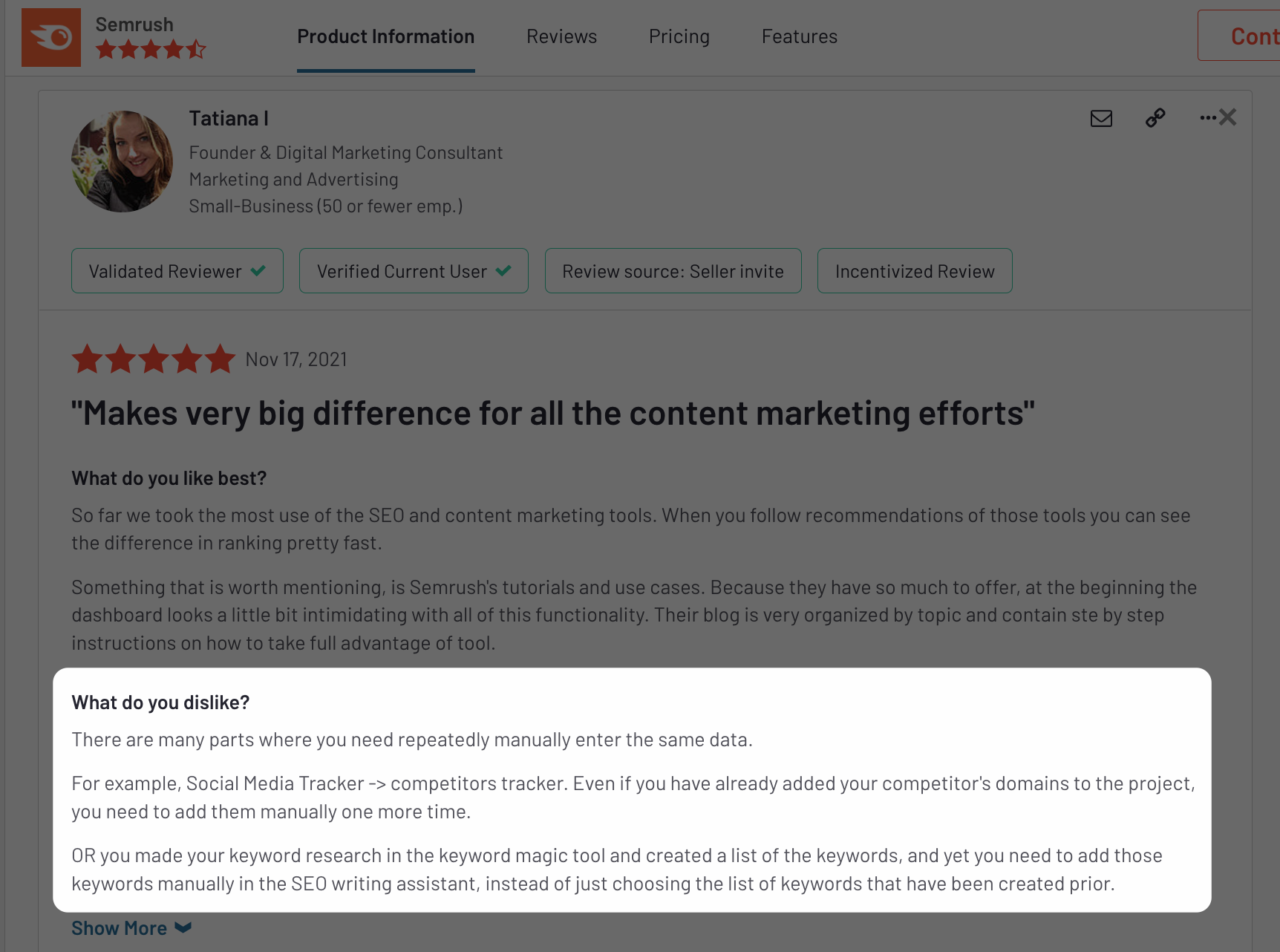
[Source ]
I bet Angela, our fictional character, dreaded researching keywords for this.
What if, instead of hacking different SEO tools, you used one tool to research keywords without exporting them to spreadsheets to sort manually?
That tool is WriterZen.
In minutes you can:
- Plug in one keyword, and it’ll cluster keywords topics for you.
- Get the necessary data to determine how crucial a particular keyword is to your content strategy.
- Find related keywords, cluster them, analyze them right on the tool, and even save them once you’re done.
Above all, you find fast-ranking keywords with accurate data as we pull our data from Ahrefs and Google API.
Ryan, one of our users, tried it out. Here’s what he had to say afterward:
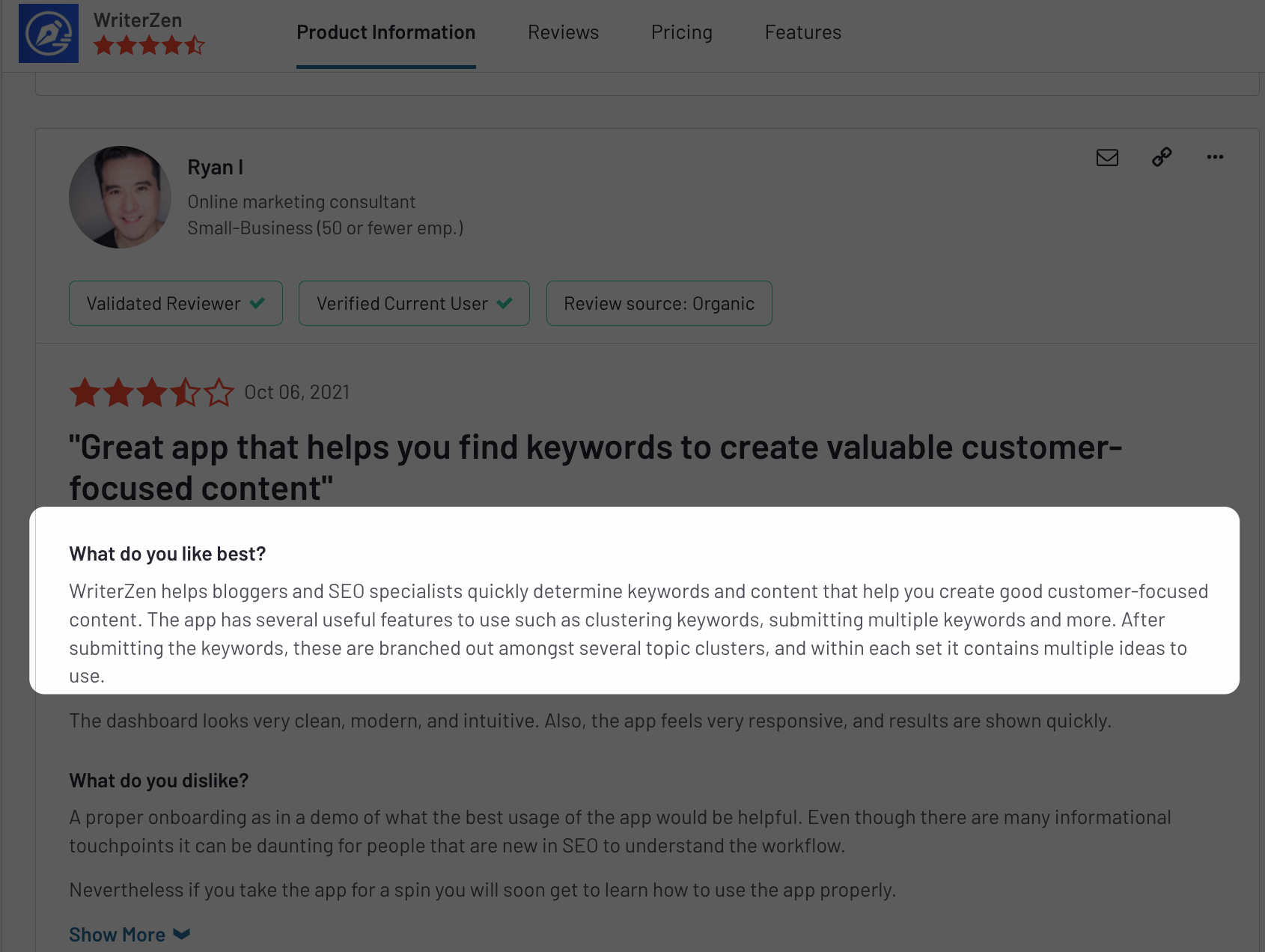
[WriterZen review on G2]
Another user did the same and said something similar:
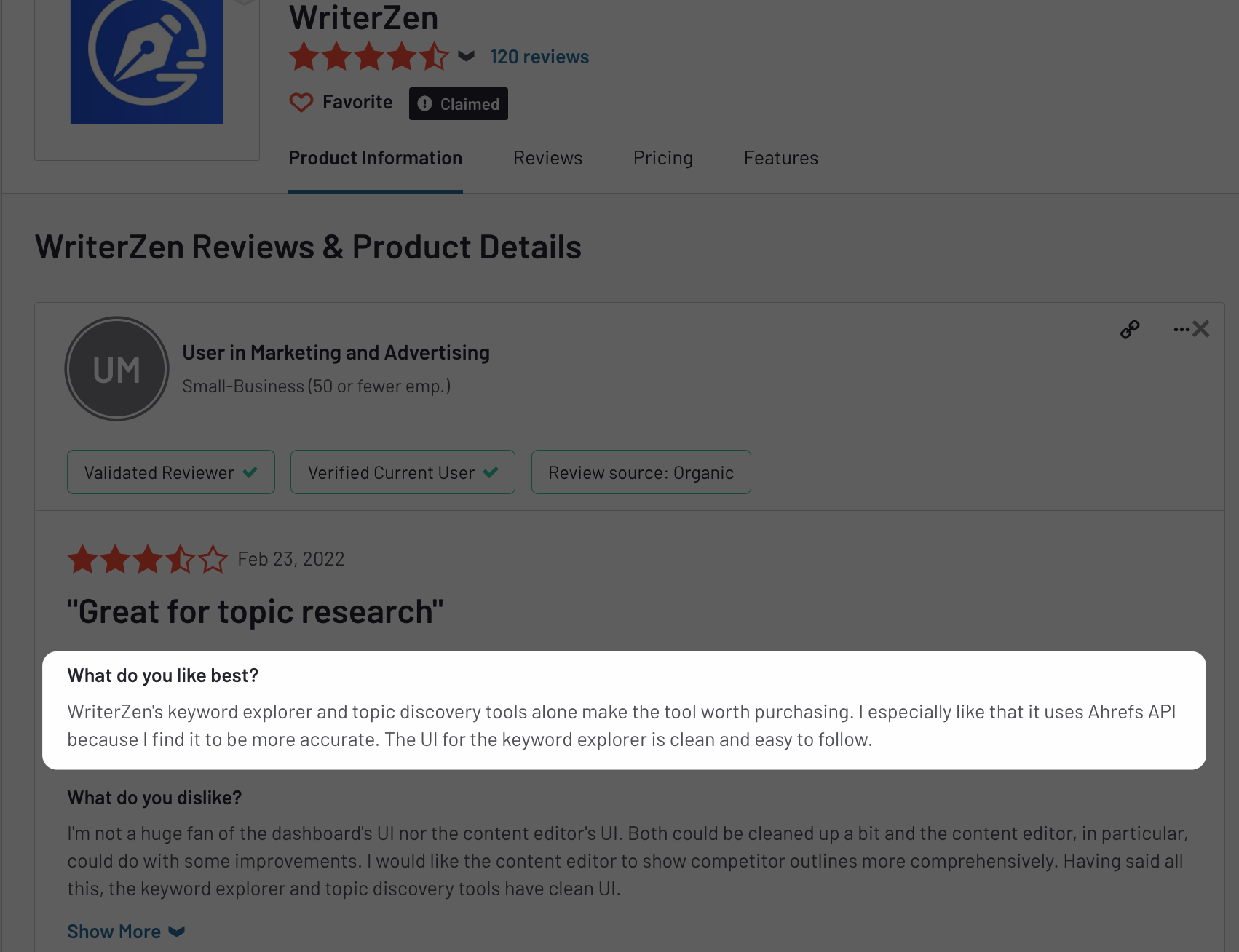
[WriterZen review on G2]

How WriterZen Simplifies Your Keyword Research Workflow
WriterZen reduces keywords research to a matter of hours.
No more back and forth. No more time-consuming steps, jumping from one tool to another and then sorting data in spreadsheets.
Here’s how WriterZen makes all that possible.
It Shows You Relevant Keyword Data at a Glance
Plug just your seed keyword into WriterZen’s Keyword Explorer, and you’ll get the search insights needed to determine its relevance to your content strategy.
And it happens in a few seconds.
Say your seed keyword is “content writing.”
This is what you get:
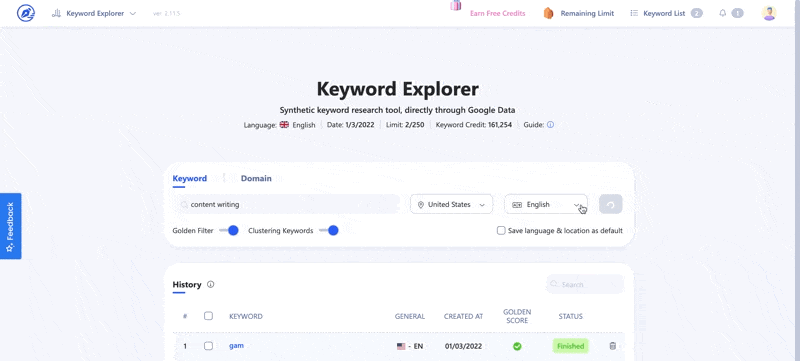
Related queries, search volume, SERP overview, CPC, word count, keyword clusters, and other vital insights staring back at you.
But it doesn’t just stop at providing you with these data.
WriterZen does something else to ensure you’re only focusing your research efforts on keywords likely to rank faster.
It Finds Fast-Ranking Keywords in Minutes
After finding keywords, how do you tell which would rank fast or not?
By the search volume or SEO difficulty? Or you simply target any relevant keyword, build backlinks to your page, and wait for Google to do its magic?
That would be a huge gamble.
What if, instead, you had an easier route to finding fast-ranking low-competition keywords without racking your brain?
It’s called the Golden Filter, and it’s right on WriterZen.
This filter determines in a few minutes if a particular keyword is worth your SEO efforts or not.
With this in place, you not only find queries target users are searching for.
When you use these keywords to create content, they’re more likely to rank on SERPs faster and boost your organic traffic.
The golden filter works in two ways:
1. Ranking Probability: Use this if you deal with low-authority websites. It allows you to filter up to 100 search results with a low allintitle. So, if you want keywords with as little as ten allintitle, you only need to adjust the filter to fetch them.
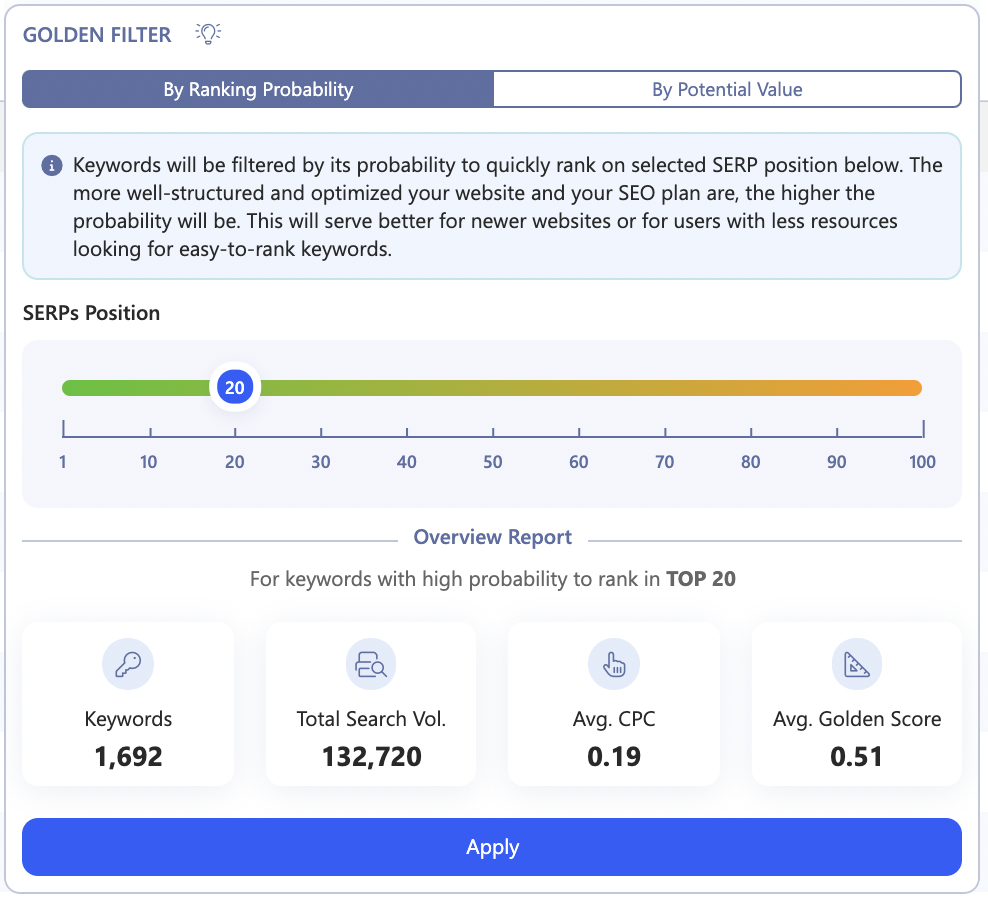
2. Potential value: If you work with high-authority websites, use this to find both keywords with low allintitle, low search volume, and high allintitle, high search volume.
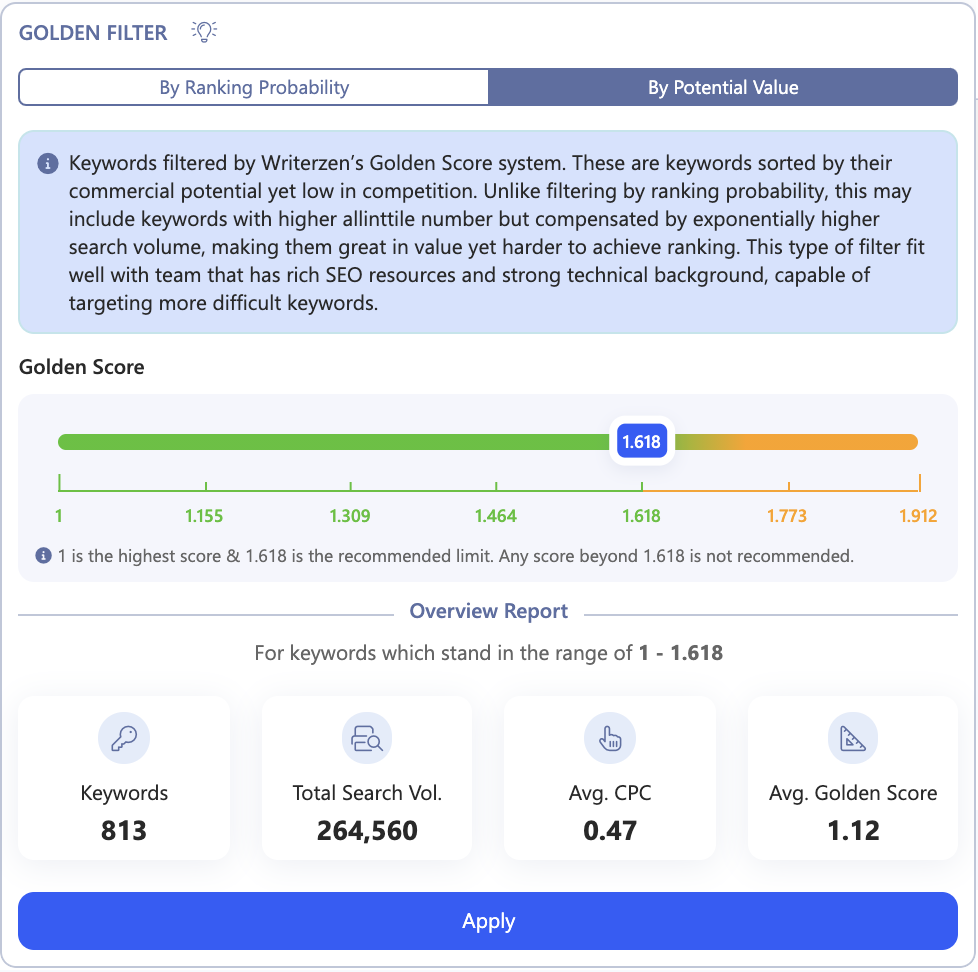
Let’s use the Golden Filter to find fast-ranking keywords for “content writing:”
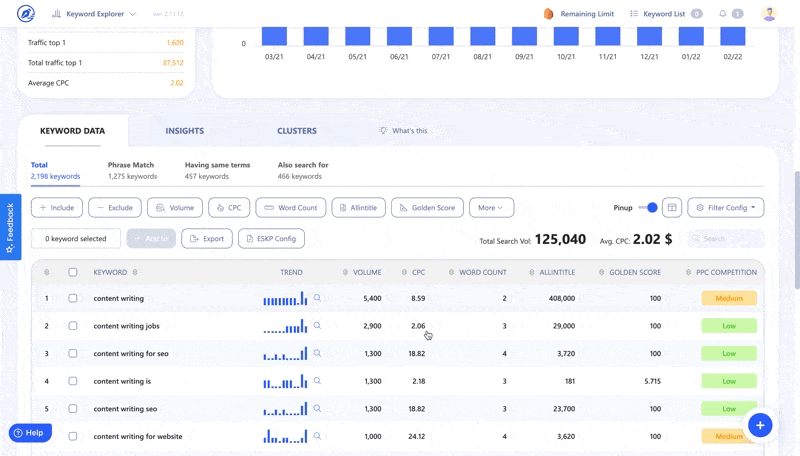
It Collates Your Selected Keywords
No need to switch tabs to store your chosen keywords on a Google sheet.
You can do it right on WriterZen by adding to a list or group or exporting as an XLS or CSV file.
See for yourself:
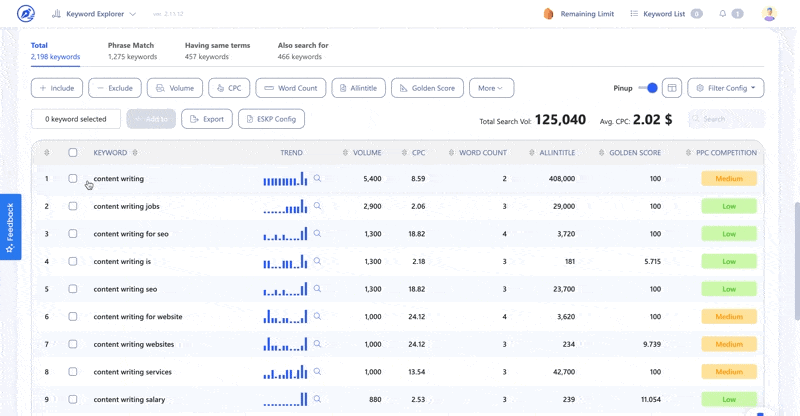
This saves you from manual sorting and preserves time and energy for other vital tasks.
You can Import & Cluster Keywords from Other Sources
WriterZen also fosters collaboration with other tools. In other words, you can always use WriterZen even after getting keywords with other tools.
Here’s how it works.
Say you already researched your keywords on another tool.
You don’t have to go through the manual process of exporting and sorting in a spreadsheet. You can import the keywords to WriterZen to cluster and sort them at once.
This comes in handy as not every tool makes this provision for you.
Take Ahrefs, for instance.
This tool excels at crunching keyword data, backlinks, competitor domains, SERP results, and other valuable insights. But it doesn’t cluster keywords under relevant topics. It requires extra manual exporting and sorting in a spreadsheet.
Imagine you got 1000 keywords.
How tiring would it be to sort and cluster them after taking great pain to find them?
The solution?
Don’t dig through the results to sort your keywords in spreadsheets. Instead, import them to WriterZen and have it clustered around topics for you.
Let’s say you researched, “content writing,” a keyword with over 3,200 results on Ahrefs:
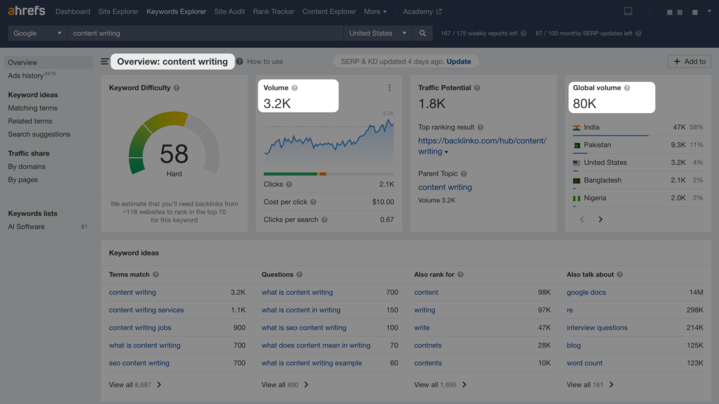
Next, export keywords:
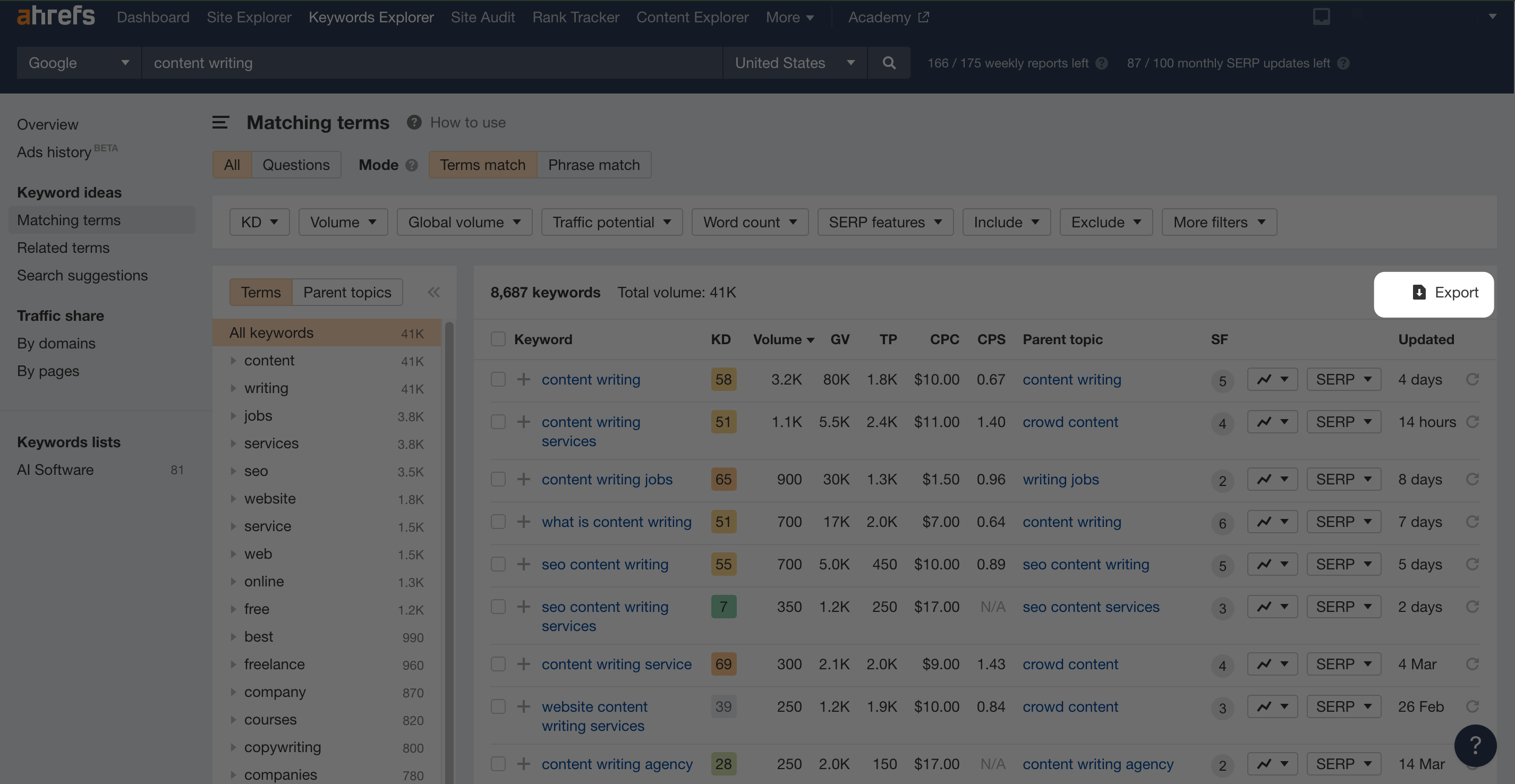
To import your keywords into WriterZen for clustering, you have two options. Either you copy the keywords from the spreadsheet and paste them directly into the Keywords Importer tool:
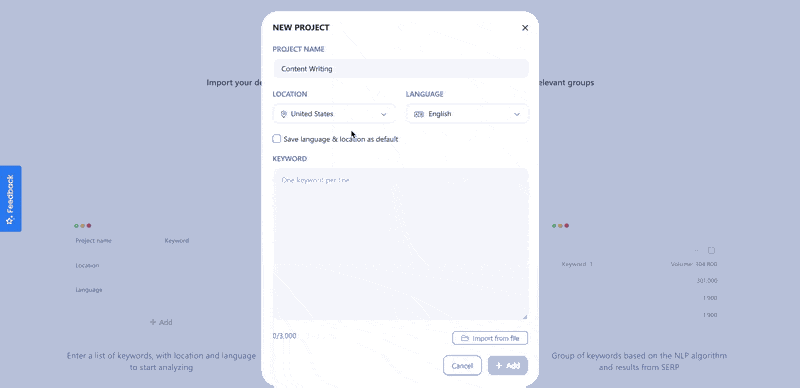
Or, you upload it as a .txt file:
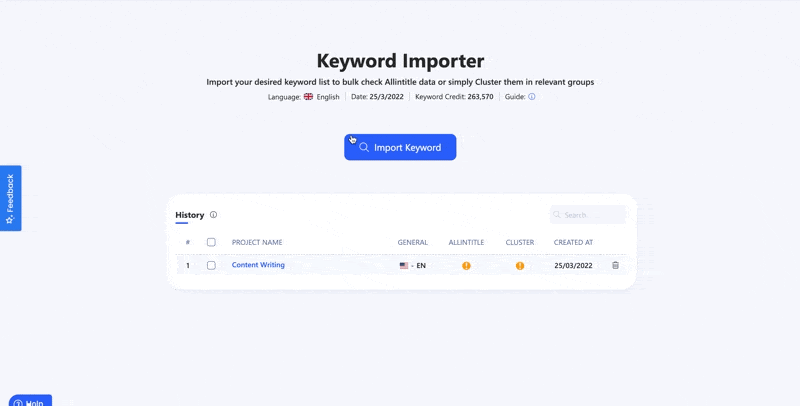
Once the import is complete, you’ll not just find clusters for each keyword. You can move straight to using the Golden Filter to determine fast-ranking keywords in one sitting.
Take a look:
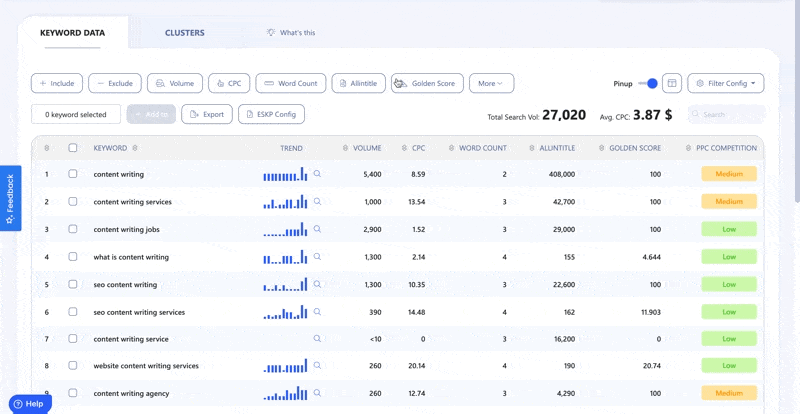
It Allows for Easy Content Production
It’s not enough to research keywords.
The effort would be worthless if can’t leverage them for creating high-ranking content. Again, you don’t have to export keyword research insights into a Google doc or Word document.
You can do it right on WriterZen with the Content Creator.
First, it helps in researching a keyword further, showing you top-ranking competitor results, related queries, and Google auto-suggest insights:
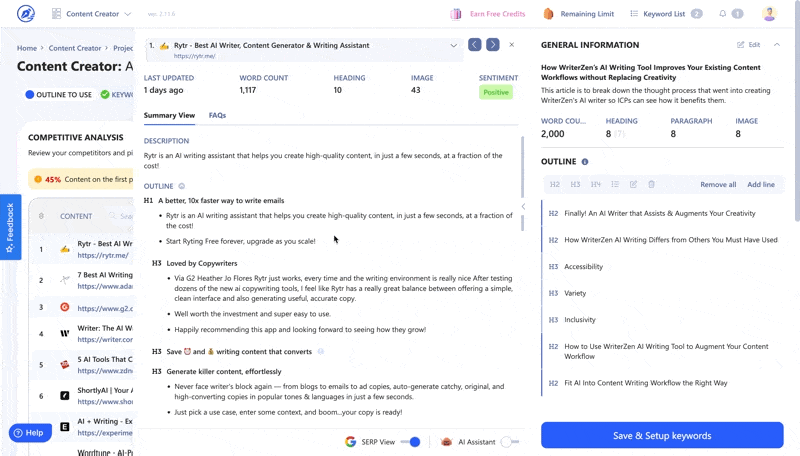
And when you begin writing, use any of the integrated AI writing assistant templates to cue yourself when words elude you:
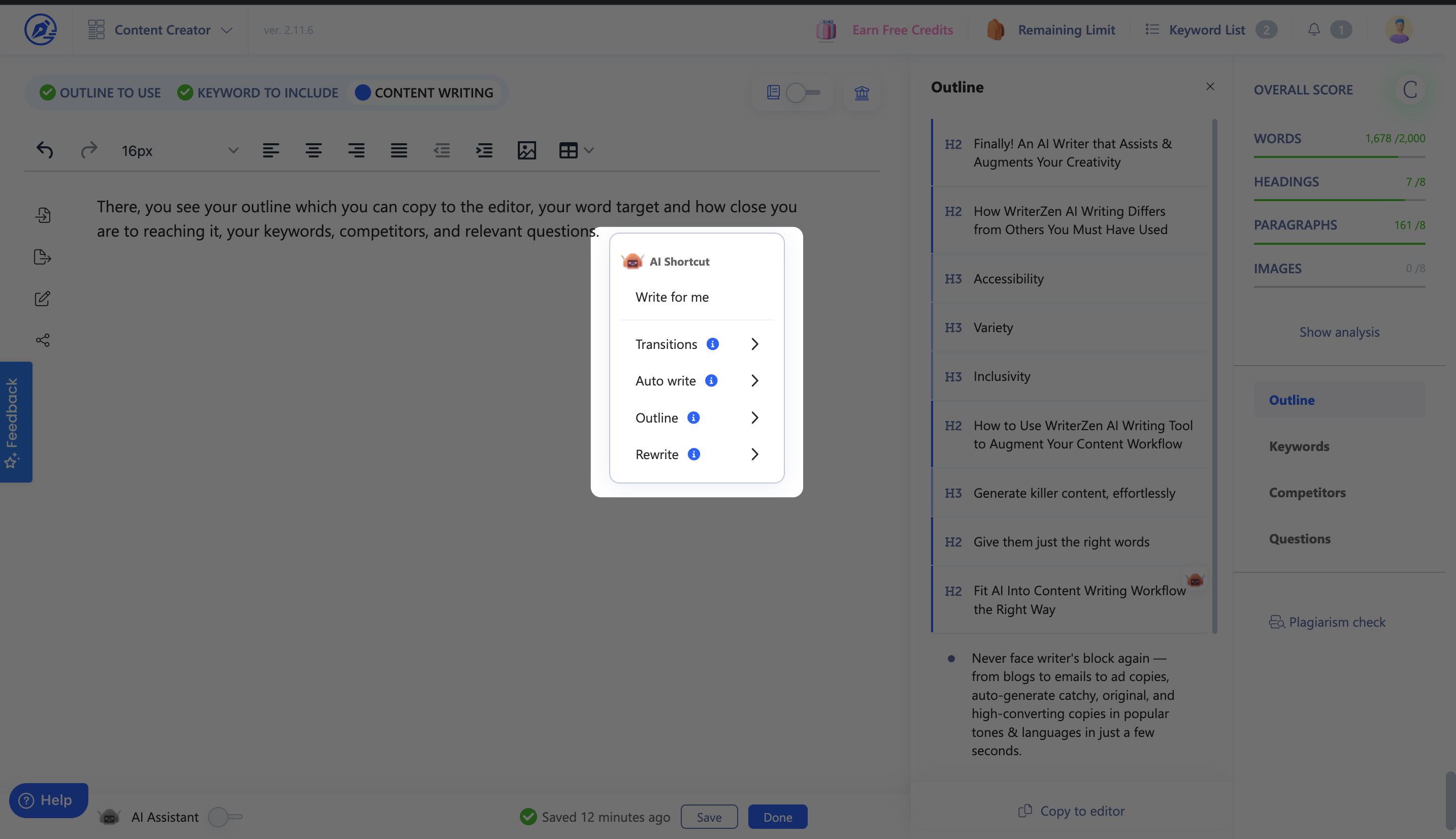
Here’s me doing so to rewrite a section of this draft:
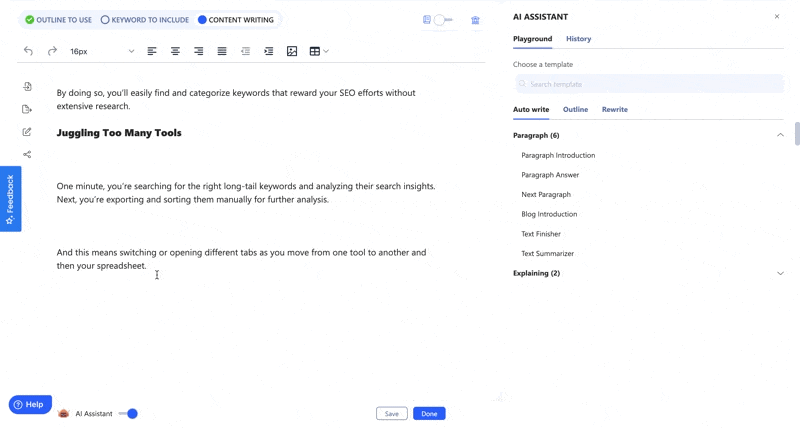
When you’re done, the plagiarism checker ensures your content is 100% original. Again, I did that for this draft you’re reading:
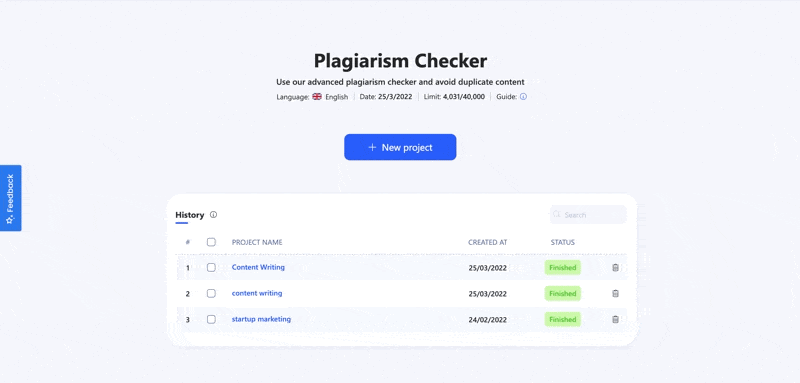
These extra benefits go without saying that WriterZen doesn’t just ease your keyword research process but also simplifies your entire content workflow.
Simplify Your Keyword Research Workflow Today
As Neil Patel opined:
“The simple goal of keyword research is to find out what your target audience is searching and what it will take to actually rank for those keywords.”
Imagine missing out on this because you found the process overwhelming and couldn’t keep up anymore.
Now tell me…
Would you rather keep struggling with your keyword research process or jump on a tool that handles that and more without switching platforms or tabs?
If the latter is your answer, WriterZen is for you.
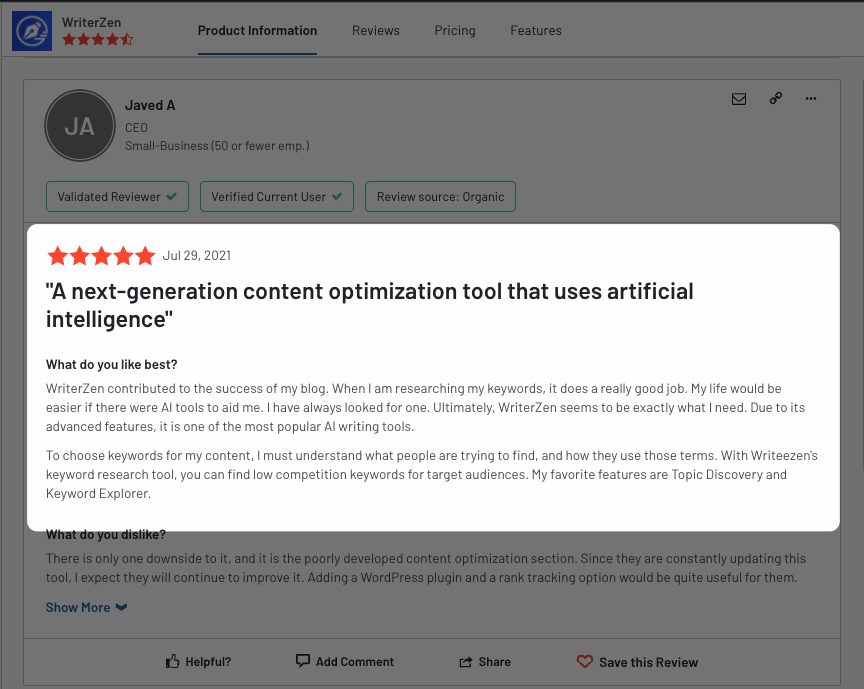
===========================================
https://writerzen.net/blog/keyword-research-workflow
#WriterZen, #keywordresearchworkflow, #keywordresearchworkflowWriterZen



Nhận xét
Đăng nhận xét